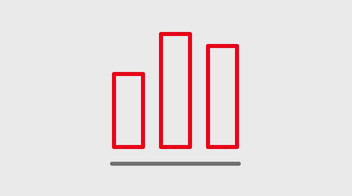Development in the year under review
- The development was marked by a further increase in passenger numbers, new transport contracts and the introduction of the Germany-Ticket.
- Additional impact from higher costs – especially for energy and personnel, as well as strikes and heavy construction on the network.
- Operating profit development still under pressure.
DB Regional | 2023 | 2022 | Change | |
absolute | % | |||
Punctuality (rail) (%) | 91.0 | 91.8 | –0.8 | – |
Punctuality (bus) (%) | 85.2 | 86.0 | –0.8 | – |
Customer satisfaction (grade) – rail | 2.2 | 2.2 | – | – |
Customer satisfaction (grade) – bus | 2.0 | 2.2 | –0.2 | – |
Passengers (million) | 2,244 | 2,072 | +172 | +8.3 |
thereof rail | 1,697 | 1,605 | +92 | +5.7 |
Volume sold (million pkm) | 43,495 | 39,804 | +3,691 | +9.3 |
thereof rail | 37,485 | 34,754 | +2,731 | +7.9 |
Volume produced (rail) (million train-path km) | 420.3 | 433.7 | –13.4 | –3.1 |
Volume produced (bus) (million bus km) | 529.0 | 502.1 | +26.9 | +5.4 |
Total revenues (€ million) | 9,706 | 9,039 | +667 | +7.4 |
External revenues (€ million) | 9,536 | 8,921 | +615 | +6.9 |
Rail concession fees (€ million) | 6,759 | 6,508 | +251 | +3.9 |
EBITDA adjusted (€ million) | 634 | 619 | +15 | +2.4 |
EBIT adjusted (€ million) | –22 | –31 | +9 | –29.0 |
Gross capital expenditures (€ million) | 606 | 716 | –110 | –15.4 |
Employees as of Dec 31 (FTE) | 39,587 | 37,738 | +1,849 | +4.9 |
Employees annual average (FTE) | 38,763 | 37,599 | +1,164 | +3.1 |
Employee satisfaction (SI) | – | 3.7 | – | – |
Share of women as of Dec 31 (%) | 17.1 | 16.9 | +0.2 | – |
Specific final energy consumption (rail) compared to 2006 (based on pkm) (%) | –31.7 | –23.8 | –7.9 | – |
Specific final energy consumption (bus) compared to 2006 (based on bus km) (%) | –1.1 | –0.4 | –0.7 | – |
Figures for 2022 correspond to the values for the DB Regional Bus line of business published in the 2022 Integrated Report. Intra-Group reallocations did not have a significant effect on the key figures.
The punctuality of DB Regional decreased slightly for both regional transport and S-Bahn (metro) services overall. The main drivers are high levels of construction activities with capacity bottlenecks in the network, higher infrastructure disruptions and many restricted speed sections. In some regions, unoccupied interlockings led to further capacity bottlenecks and punctuality losses. In addition, the high number of external individual events continues to affect the operating quality of S-Bahn (metro) trains in metropolitan regions.
Punctuality in bus transport also declined slightly, partly due to the tense personnel situation.
The development of customer satisfaction was inconsistent:
- DB Regional Rail: Passenger satisfaction with the current journey (formerly overall satisfaction) remained stable overall in 2023. While regional transport remained unchanged at 2.2, the current journey satisfaction figure for the S-Bahn (metro) services fell slightly to 2.2. This was driven by a development in punctuality.
- DB Regional Road: For bus companies, satisfaction with the current journey has improved slightly.
Performance development was very pleasing:
- DB Regional Rail: The number of passengers and volume sold developed positively, driven largely by the recovery in demand after measures to contain the Covid-19 pandemic in 2022 and the introduction of the Germany-Ticket in May 2023. The omission of the 9-Euro-Ticket (available in the period from June to August 2022) had a dampening effect.
- DB Regional Road: The negative effects of Covid-19 also continued to decline in this line of business. Winning tenders had a supporting effect, meaning that bus performance development was also very positive.
The economic development of DB Regional was better but remained under pressure. The increase in income was partially offset by additional burdens, particularly in the DB Regional (rail) line of business, due to higher energy costs and strikes, for example. Operating profit figures continued to improve, but adjusted EBIT remained negative.
Income development was positive:
- Revenues (+7.4%/€ +667 million): The increase was primarily due to higher concession fees, demand-related higher income from fares in rail transport, and performance gains in bus transport. Fare revenue effects in connection with the introduction of the Germany-Ticket in May 2023 were almost completely compensated by offsetting payments.
- Other operating income (–15.1%/€ –145 million): Decrease, mainly as a result of the loss of Government grants from the industry solution for local public transport, which was intended to compensate for Covid-19 damage. This was offset by the effects of a change in cost allocation as a result of the introduction of the Germany tariff association (countereffect in cost of materials), as well as increased compensation for damage.
On the expense side, there were additional pressures primarily from demand and price-related increases in the cost of materials and higher personnel expenses, partly as a result of collective bargaining agreements:
- Cost of materials (+4.8%/€ +298 million): Significant increase mainly due to higher energy expenses due to price effects (also taking into account payments from the electricity price brake) and higher purchased transport services. In addition, the expenses for maintenance and inspections increased due to price- and volume-related reasons. Lower expenses for the use of train paths and stations due to volume development had a dampening effect in rail transport in some cases.
- Personnel expenses (+6.9%/€ +163 million): Noticeable increase, above all as a result of collective bargaining agreements and a higher average number of employees.
- Other operating expenses (+8.8%/€ +80 million): Driven by the Group charges introduced in 2023 and the implementation of digitalization, vehicle availability improvement and passenger care measures increased due to the tense infrastructural situation. Lower additions to provisions for impending losses had a dampening effect.
- Depreciation (+0.9%/€ +6 million): Capital expenditure-related increase driven by the DB Regional Road line of business.
Capital expenditure activities decreased in line with the requirements of awarded transport contracts.
The number of employees was above the level as of December 31, 2022, for performance-related reasons. The integration of ioki had an additional increasing effect.
The share of women was slightly above the level at the end of the previous year.
In 2023, the specific final energy consumption on rail fell compared to 2006. Capacity utilization has not yet returned to pre-Covid-19 levels, but significant improvements have been achieved in the field of energy efficiency. This was mainly due to the further development of the regional energy savings system (RESY), which resulted in savings of 2.9 million liters of diesel in 2023. In addition, traction unit drivers were made aware of the topic of energy efficiency monthly through an extract on their energy-saving driving. Furthermore, accompanying trips, regular further training and communication measures on energy saving and driving strategies took place.
DB Regional rail line of business
- Further increase in passenger numbers, mainly due to the introduction of the Germany-Ticket.
- Additional impact from higher costs, especially for energy, as well as strikes and heavy construction on the network.
- A tense personnel situation led to train cancellations.
DB REGIONAL rail line of business | 2023 | 2022 | Change | |
absolute | % | |||
Passengers (million) | 1,697 | 1,605 | +92 | +5.7 |
Volume sold (million pkm) | 37,485 | 34,754 | +2,731 | +7.9 |
Volume produced (million train-path km) | 420.3 | 433.7 | –13.4 | –3.1 |
Total revenues (€ million) | 8,371 | 7,878 | +493 | +6.3 |
External revenues (€ million) | 8,254 | 7,769 | +485 | +6.2 |
Rail concession fees (€ million) | 6,759 | 6,508 | +251 | +3.9 |
EBITDA adjusted (€ million) | 626 | 698 | –72 | –10.3 |
EBIT adjusted (€ million) | 63 | 134 | –71 | –53.0 |
Gross capital expenditures (€ million) | 414 | 589 | –175 | –29.7 |
Employees as of Dec 31 (FTE) | 28,883 | 28,076 | +807 | +2.9 |
The recovery in demand continued in 2023. The introduction of the Germany-Ticket had a noticeably positive effect on volume sold, which was dampened by the omission of the 9-Euro-Ticket. As a result, number of passengers and volume sold rose significantly. The volume produced fell slightly as a result of the loss of transport services and strikes.
Economic development continued to be challenging. The positive revenue development was more than consumed by cost increases:
- Income increased at a disproportionately low rate: this was mainly driven by performance-related higher fare revenues and higher concession fees. The main dampening effects were the omission of the compensation mechanism for the industry solution for local public transport, increased compensation payments due to weaker operating quality, and strikes by the EVG and the GDL.
- The expense side, on the other hand, increased significantly. This was mainly due to higher personnel expenses as a result of collective bargaining agreements and performance reasons, as well as increased construction-related expenses for rail replacement services. Energy price increases, the Group charges introduced in 2023 and digitalization measures also increased expenses.
Capital expenditure activities developed in line with the requirements from transport contracts awarded and were down significantly.
The number of employees increased slightly as a result of continued high human resources requirements.
DB Regional Road line of business
- Pooling of ioki and bus activities into an integrated mobility service.
- Performance gains are driving revenue development.
- Increased expenses due to higher costs due to inflation, in particular for purchased transport services and for personnel as a result of collective bargaining agreements.
DB REGIONAL Road line of business | 2023 | 2022 | Change | |
absolute | % | |||
Passengers (million) | 546.8 | 467.2 | +79.6 | +17.0 |
Volume sold (million pkm) | 6,010 | 5,049 | +961 | +19.0 |
Volume produced (million bus km) | 529.0 | 502.1 | +26.9 | +5.4 |
Total revenues (€ million) | 1,601 | 1,344 | +257 | +19.1 |
External revenues (€ million) | 1,282 | 1,152 | +130 | +11.3 |
EBITDA adjusted (€ million) | 7 | –79 | +86 | – |
EBIT adjusted (€ million) | –86 | –165 | +79 | –47.9 |
Gross capital expenditures (€ million) | 192 | 126 | +66 | +52.4 |
Employees as of Dec 31 (FTE) | 10,704 | 9,661 | +1,043 | +10.8 |
Values for 2022 correspond to the values for the DB Regional Bus line of business published in the 2022 Integrated Report. Intra-Group reallocations did not have a significant effect on the key figures.
The significantly positive performance development in bus transport resulted from performance gains and the progressive recovery in demand.
The operating profit figures improved significantly. However, the economic situation remains challenging:
- Income increased as a result of performance development, in particular as a result of tender wins and rail replacement services as well as contractual agreed price adjustments due to higher costs. Lower Government grants had a dampening effect.
- Expenses rose significantly weaker than income. The increase was mainly driven by higher expenses for purchased transport services and maintenance due to price and volume effects. Personnel expenses also increased due to the higher average number of employees, and as a result of collective bargaining agreements. Regarding expenses for diesel negative volume effects were almost completely offset by positive price effects. A lower addition to provisions for impending losses had a dampening effect.
Capital expenditures increased significantly due to performance gains.
The number of employees increased due to performance and as a result of the integration of ioki.


